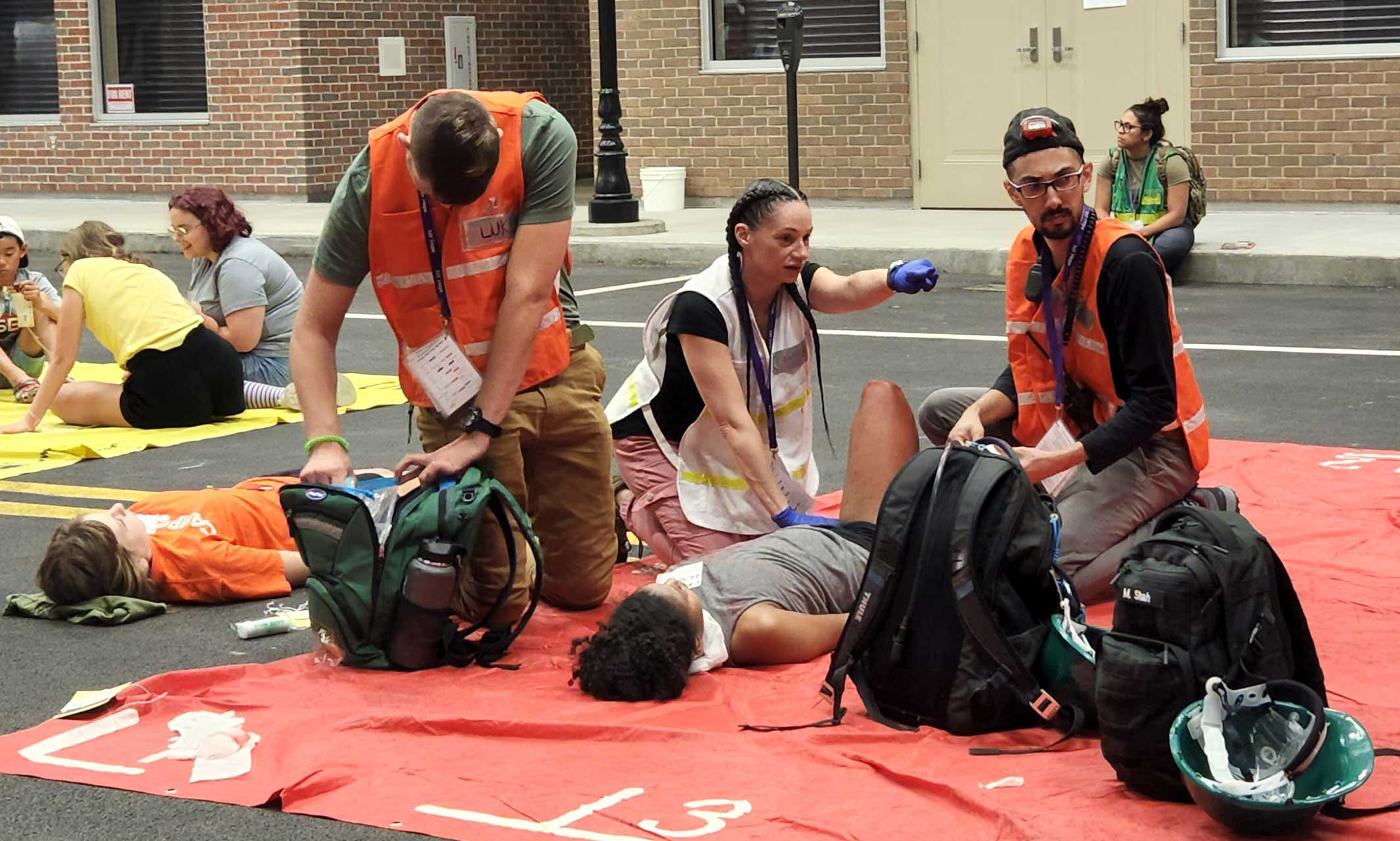Nursing student Faheem Rehman can add white water rescue to the skills he’s developed during his time at UMKC. Rehman was part of a group from the UMKC School of Nursing and Health Studies that participated in New York Hope, a national domestic disaster response exercise where participants hone their skills as emergency responders.
Held over four days at the Department of Homeland Security Training Facility in Oriskany, New York, the training partners college students in nursing, emergency management and homeland security with first responders for a simulated disaster similar to an earthquake. That included experience with swift water rescue, search and rescue in a demolished building and a mass casualty event in a shopping center.
Only three nursing schools were represented and of those just ten nursing students attended. In her role as assistant professor in the UMKC School of Nursing and Health Studies, Sharon White-Lewis has long been a champion of the Hope Exercises, which also include Missouri and Florida, where she has taken dozens of college students through the years.
In his second year as a nursing student, Rehman was excited for the opportunity to test his skills in such a unique environment.
“I’ve been in inpatient units where it’s a more controlled environment where you have a certain level of understanding of what’s going to occur,” Rehman said. “With the nature of a disaster or crisis, you don’t have that luxury.”
When he first arrived at the event, everything seemed foreign. There were four days without access to his phone or even a shower, sleeping on a cot next to people he’d never met. Once he settled in, Rehman was surprised how quickly he adjusted to this new normal.
"It really was incredible how quickly your mind adjusts to a setting like that,” Rehman said. “By the second day, it really did feel like my new home.”
That also meant teaming up with a group of complete strangers for the exercise. But Rehman said he and his teammates quickly developed an understanding of each other’s strengths and weaknesses and delegated accordingly.
“It felt like trauma bonding,” Rehman said. “By the end of our time together, I felt an inseparable bond with my team members. Even now we’re keeping in touch, texting each other.”
Rehman said the mass casualty exercise offered the most significant stress test on the nursing skills that he’s developed at UMKC. One of the more elaborate scenarios, which involves dozens of actors role-playing a wide range of injuries across a mock shopping mall.
“We set up a triage system where we prioritized people by walking wounded, delay care, immediate care and deceased,” Rehman said. “Doing all that quickly and efficiently really helped me hone my assessment skills.”
Triage wasn’t new for Rehman. White-Lewis took the students through a four-hour class before they departed for New York. In the training she covered the triage techniques unique to disaster response as well as other in-the-field medical treatments like spine mobilization and splints.
Rehman said he enjoyed the swift water rescue exercise most as it looked both “scary and fun.” The scenario put the participants in a pool with a fast-flowing current at a speed Rehman said he’d never experience before. According to White-Lewis, participants train in a level one current but the rapids can be pushed to a level four.
With his fellow participants, Rehman worked on both rescuing and being rescued. The local fire department taught them techniques for throwing ropes to someone in the current and skills to stay afloat while navigating a fast-moving current. White-Lewis said it’s a critical experience for the Kansas City area. “We’ve had a number of floods and emergency responders have had to rescue lots and lots of people.”
According to Rehman, the event left an indelible impression that has expanded his outlook on what nurses are capable of.
“It showed me that nursing isn’t limited to the walls of a hospital or a doctor’s office,” he said. “The preparation we were doing – readying ourselves for future disasters – this is for the greater good of society.”
White-Lewis will continue to provide students with this life altering opportunity when Missouri Hope will be held in the fall in Joplin, Missouri. She plans to bring 35 students with her. That scenario mirrors the aftermath of a tornado and she says it’s important experience for UMKC students. According to White-Lewis, after the devastating Joplin tornado in 2011, 135 nurses were deployed to the area to provide care.
“Students tell me these events change their lives,” she said. “They actually have to rely on themselves and they’re proud of themselves for utilizing their nursing skills. In nursing school it’s a lot of input, input, input, with all the studying. With this experience they get to output all of their knowledge.”

